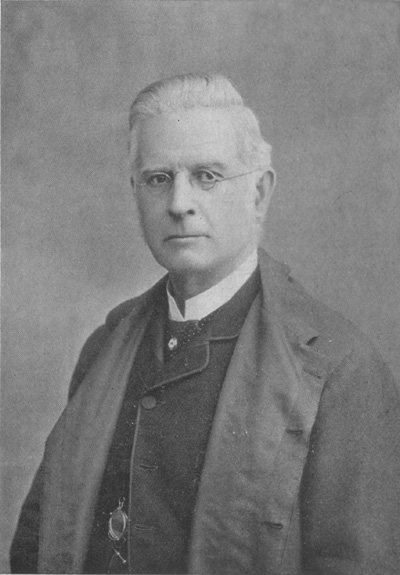
1904
After Work
|
|
Edward Marston (1824-1915) became a partner in the publishing firm of Sampson Low from 1856 and ran the firm from 1881. His book After Work – Fragments from the Workshop of an Old Publisher (1904) is a chronological account of the changing Victorian publishing business through the second half of the nineteenth century. His few pages about Wilkie Collins mainly concern the publication of The Woman in White. Sadly, the other letters in his possession have now disappeared. |
CHAPTER IV
WILKIE COLLINS
I have in my possession many most interesting letters from Wilkie Collins, they are all on business matters; it would be difficult to quote from them intelligently without reference to our own letters, to which his were mostly replies. I have been unable to trace our letters so far back, consequently I can only give a few examples. Concerning "The Woman in White" I have to rely on my own memory entirely, for I have not been able to find any correspondence on either side with regard to our original agreement. This work originally appeared in Charles Dickens's "All the Year Round." It attracted unusual attention, and it was through the good offices of Mr. Wills – Mr. Dickens's friend and collaborateur – that we were introduced to Mr. Collins. We published the work in the early part of 1860, and with reference to a new issue of it he wrote me the following characteristic letter:
"12 Harley Street,
"31st Oct., 1860.
"My Dear Sir,
". . .If any fresh impression of 'The Woman in White' is likely to be wanted
immediately, stop the press till I come back. The critic in the 'Times' is
(between ourselves) right about the mistake in time. Shakespeare has made worse
mistakes – that is one comfort, and readers are not critics who test an
emotional book by the base rules of arithmetic, which is a second consolation.
Nevertheless we will set it right the first opportunity . . . . They are going
to dramatise the story at the Surrey Theatre, and I am asked to go to law about
that. I will certainly go and hiss unless the manager makes a
'previous arrangement' with me."
This work had a very large sale. Its success, however, as usual brought many competitors into the field for Mr. Collins's next novel, "No Name." I may say that Mr. Collins had a perfect knowledge of his own value; he stood in no need of a literary agent to make bargains for him, at all events, till his health broke down. I find no correspondence about this work, but the following copy of a document in my possession is sufficiently significant.
"47, Ludgate Hill,
"Jan. 5, 1863.
"Received from Messrs. Sampson Low, Son, and Marston, for the copyright of "No
Name."
Cash . . . . . . . . . . 500
0 0
Per note at 3 months . . 500 0 0
Per note at 6 months . 1,000 0 0
Per note at 9 months . 1,000 0 0
£. 3,000 0 0
(Signed) " WILKIE COLLINS."
This heavy payment was for a novel far inferior to "The Woman in White," but following as it did so closely in the wake of that wonderful novel, it had a very considerable sale, and we came off without loss. It was a great risk forced upon us by very vigorous competition.
We had previously made arrangements with Mr. Collins for the publication of most of his other works, and I quote the following letter which has reference to "The Woman in White," in the one-volume form, and three or four of his later books, just to show how closely competition ran even in those days.
"Mr. Blackett called here last night, when I was out, and left word that he would return this morning; his visit has just ended, and I at once write to tell you that the object of it was to negotiate for the right of printing my novels in his 'Standard Library.' I of course informed Mr. Blackett that an arrangement of a similar nature was under consideration between you and myself, and that I could only entertain an offer from another publisher on the condition of first placing you in a position to make your proposal on the same basis. Mr. Blackett at once admitted the justice of this claim, authorized me to mention his name and agreed that I should tell you what the basis is on which he desires to found his proposal."
Mr. Collins then proceeds to state the conditions at great length.
Mr. Collins's long letter was fair and candid throughout, and there was not much to complain of in a brother publisher trying to cut us out.
The next letter, however, settled the matter.
"21st Nov., 1860.
"Harley St., W.
"DEAR SIRS,
"Your offer and Messrs. Hurst and Blackett's offer are both before me, and are both for the same amount. . . Under these circumstances the publishers of the first reprint of 'Woman in White,' have a personal claim on me which I now accept, and I especially thank you for the very liberal provision which gives me back the Copyrights of 'Antonina' and 'Basil,' at the end of the five years' term as a free will offering on the part of my publishers.
"I am, dear Sirs,
"Very truly yours,
(Signed) "WILKIE COLLINS."
---
[Later in this chapter "In the Sixties," Marston discusses Charles Reade]
Mr. Reade had a very high opinion of Mr. Wilkie Collins -- one of his rivals. He placed him first of all for literary ingenuity in building up a plot.
From After Work by Edward Marston, William Heinemann, London and Charles Scribner's Sons, New York 1904, pp84-87